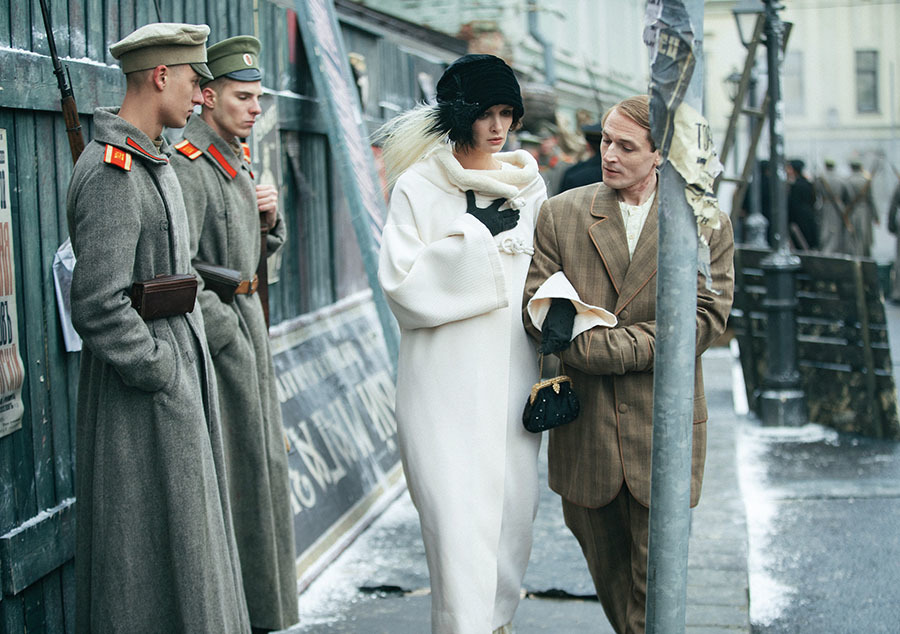The idea of a biographical project about the legendary artist Alexander Vertinsky was proposed back in 2013 by his daughter, actress Anastasia Vertinskaya.
The General Director of Channel One and producer Konstantin Ernst took up the development together with the scriptwriter and director, winner of the Moscow International Film Festival Avdotya Smirnova ("Cococo", "Walk").
According to Ernst, production had to be frozen in 2014 for economic reasons, but now the filmmakers are ready to present the project to the viewer.
In addition to Avdotya Smirnova, the script was written by Anna Parmas and John Shemyakin.
Alexey Filimonov, Paulina Andreeva, Sergey Umanov, Victoria Isakova, Alexander Ustyugov, Yulia Marchenko, Anna Mikhalkova and others starred in the central roles.
The action begins in 1915.
Vertinsky is 25 - it is obvious that the actor Alexey Filimonov is much older than his hero, but the narrative will take more than three decades.
Vertinsky moved to Moscow, where he was only looking for his calling.
Vertinsky and his friends - actor Alexander Mozzhukhin, artist Alexander Osmyorkin and journalist Konstantin Ageev - lead a half-starved, but at the same time carefree life, where there is a place for pranks of various scales, drunkenness and reflections on creativity.
Shot from the series "Vertinsky"
© Press service of the online cinema KION
This combination of inner fullness and external (everyday) disorder, given at the very beginning, accompanies the narrative in the future.
Vertinsky's line will unfold against the background of the great upheavals prepared for Russia in the second half of the 1910s.
At first, the hero agrees to tell Jewish jokes for borscht and cutlets, and after the revolution, already being famous, he will give his apartment for looting in order to avoid arrest, and will again sing songs for food, but not out of poverty.
It is no coincidence that the creators of the series call the tape an "eight-episode epic": from the dialogues of the characters, the viewer learns about the riots in the streets, the stop of the railway communication, and the political instability in Crimea.
It fell to Vertinsky to visit the front of the First World War as an orderly, and to emigrate from Russia in 1920.
Filmmakers associated Vertinsky's line with both large-scale historical processes and the moods of the people around him.
The series seems to affirm the idea of the unity of the fate of an individual and entire states.
The production was organized on the same scale: the tape was filmed in Russia, Hungary and Turkey with the involvement of more than 8,000 actors.
But the personal history of Vertinsky captures and beyond
historical context.
The future artist was born out of wedlock, was separated from his own sister Nadezhda, found her by accident (when she became famous as an actress) and reunited with her in Moscow.
According to the plot, the future artist, whom the working people call a master, takes on any job - from a loader to a model.
The tape also shows the relationship between Vertinsky and the film actress Vera Kholodnaya.
It is known that the celebrities really knew each other and Vertinsky dedicated songs to her.
Nevertheless, the creators of the series admit that there is a grain of fiction in the story.
The controversial question is whether it was worth representing the relationship of the artists as a love affair.
Although this situation allows you to show Vertinsky on the screen as a man who takes responsibility for someone else's family and, in addition, gets along well with children.
Shot from the series "Vertinsky"
© Press service of the online cinema KION
The tape contains famous songs by Vertinsky, including "Purple Negro", "Yellow Angel", "Tango" Magnolia "and others.
Actor Alexey Filimonov performed them independently - for this he studied vocals for three months.
The series shows how events from Vertinsky's life could have influenced the appearance of certain compositions: for example, "Cocainette" sounds after the alleged suicide of the artist's sister, who experienced unhappy love and is addicted to drugs. The anti-war song "What I Have to Say" appears after the execution of the cadets in the Moscow Kremlin.
Overall, the script is written elegantly.
The scenery and props have been meticulously worked out.
A multitude of details - from signs on buildings to elements of costumes - fill the video sequence with the flavor of the era.
A lot of different scenery is replaced in the frame: the luxurious interiors of the apartments of successful artists, the poor decoration of the artist's attic, the repulsive views of city gateways, well-equipped train compartments.
They contrast sharply with each other, but together they form a single aesthetic.
Two artists worked on the costumes: Svetlana Tegin, who dressed female characters, and Dmitry Andreev, who developed images for men, as well as supporting actors and extras.
On October 13, the first two episodes of the series will be available on the KION video service.
In the future, new episodes will appear on Mondays.

